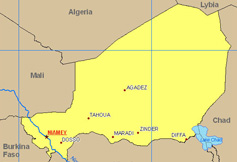Resumption of aid for Niger: Commission releases €25 million

The European Commission has released €25 million in budgetary support for Niger, the first such payment since the investiture of the new president, Mahamadou Issoufou, in April 2011 and since the EU resumed in full its cooperation with Niger on 20 June. With these funds the government will be able to step up its fight against poverty, in particular by concentrating on the social sectors (education and health).
The European Commissioner for Development Andris Piebalgs said ’This payment confirms the full resumption of our cooperation with Niger. It is a sign of our confidence in the new government and of our commitment to supporting him in the fight against poverty, in providing support to the most vulnerable sections of the population and in achieving the Millennium Development Goals.
'The funds have been released following an in-depth analysis of the eligibility criteria for budgetary support: macro-economic stability, a coherent and sustainable policy for fighting poverty and improved management of public finances. The very encouraging progress observed in these three areas made it possible to respond to the Nigerien authorities' request payment to be made as soon as possible.
Part of this payment (€10 million) is also linked to specific conditions in the area of education. During the evaluation the European Commission noted the significant work done by the government to prepare the action plan for the Quality Initiative in the area of education. President Mahamadou Issoufou is aiming to make school attendance compulsory and free of charge for all up to the age of 16. He has promised to dedicate a quarter of the budgetary resources to education over the next five years, in particular to build 2500 new classrooms and to train 2500 extra teachers each year.
Context
The EU suspended its cooperation with Niger in 2009 following former president Mamadou Tandja's unconstitutional attempt to remain in office beyond his second term. Since 2010 the European Commission has gradually resumed its cooperation, providing support for food safety, rural development, transport infrastructures and the elections. The investiture of the new president, Mahamadou Issoufou, in April 2011 signalled the completion of the country's democratic transition. The European Union confirmed the full resumption of development cooperation with Niger on 20 June 2011 (see IP/11/760).
Niger will receive financial assistance amounting to €458 million between 2008 and 2013 under the 10th European Development Fund (EDF). The main priority areas for cooperation during this period are rural development, improving food safety, transport infrastructures and good governance.















